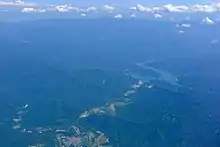| Katsurazawa Dam | |
|---|---|
 | |
| Location | Hokkaidō, Japan. |
| Coordinates | 43°14′23″N 142°00′09″E / 43.23972°N 142.00250°E |
| Construction began | 1947 |
| Opening date | 1957 |
| Dam and spillways | |
| Impounds | Kushunbetsu River |
| Height | 63.6 m |
| Length | 334.3 m |
| Reservoir | |
| Total capacity | 92,700,000 m³ |
| Catchment area | 446.2 km² |
| Surface area | 499 hectares |
The Katsurazawa Dam is a dam in Hokkaidō, Japan. It was Hokkaido's first multipurpose dam and the post-war Ishikari River watershed development plan's starting point. The dam is a 63.6m in height Concrete Gravity dam, immediately downstream from the Shinkatsurazawa Dam. The artificial lake resulting from the construction of the Katsurazawa Dam is known as the Katsurazawa Lake.
Overview
The construction of the dam would lead to the relocation of 172 households.[1] The dam's goals were to supply water for irrigation to Bibai Fields, Bibai City, Mikasa City, and also to produce up to 15,000 kW of Hydro Electric Power.[2]

Shin-Katsurazawa Dam (Modified Katsurazawa Dam)

View from an airplane
Wikimedia Commons has media related to Katsurazawa Dam.
References
- ↑ FUKADA, Atsuo (2003-07-01). "Study on the Cretaceous System around the Katsurazawa Dam on the Ikushumbetsu River". Annual Report. 4: 119–131.
- ↑ "桂沢ダムの概要". www.sp.hkd.mlit.go.jp. Retrieved 2017-03-18.
This article is issued from Wikipedia. The text is licensed under Creative Commons - Attribution - Sharealike. Additional terms may apply for the media files.